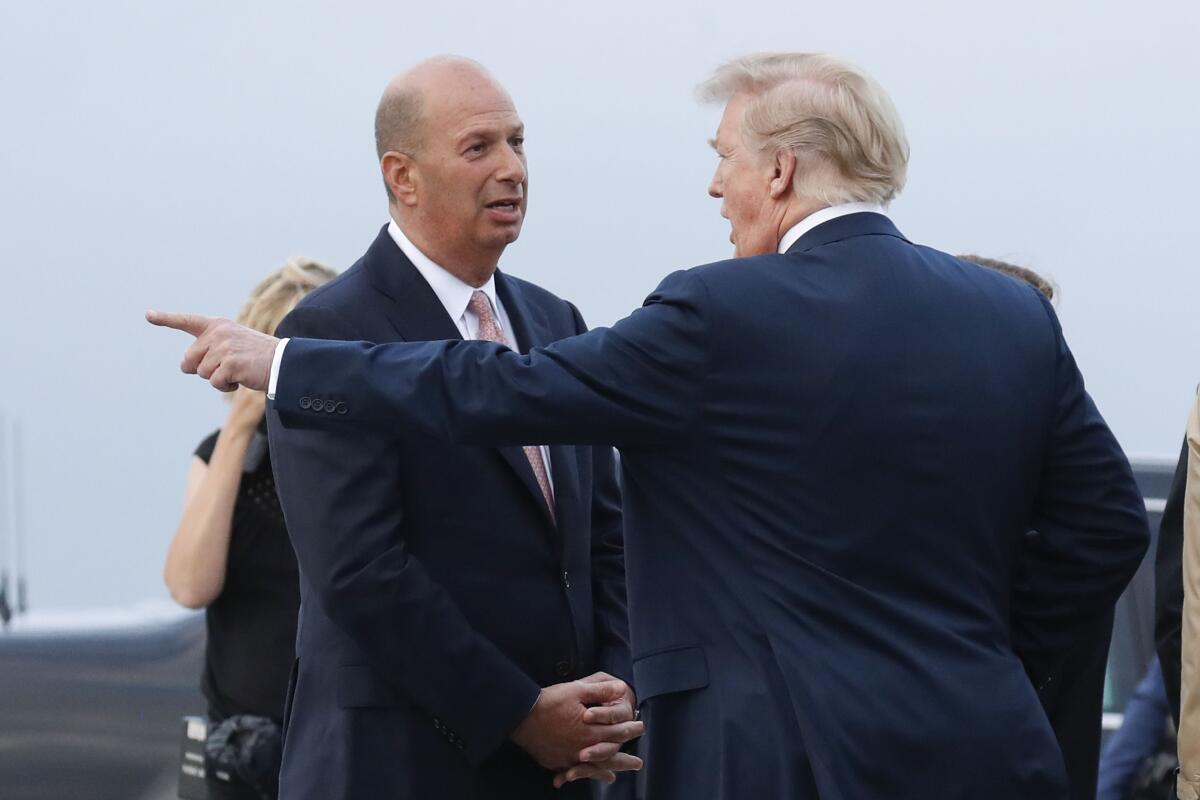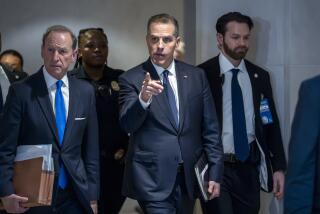Ambassador and Oregon hotelier Gordon Sondland faces backlash at home over role in Ukraine scandal

- Share via
SEATTLE — President Trump’s man in Brussels found events spinning out of control when he arrived in Washington, D.C., expecting to testify before House committees this week.
Gordon Sondland, appointed U.S. ambassador to the European Union after contributing $1 million to Trump’s inauguration, was to be deposed in the impeachment inquiry for his apparent role in pushing Ukraine to investigate former Vice President Joe Biden. But the White House blocked Sondland from testifying at the last minute Tuesday, prompting the committees to subpoena him.
Democrats expressed anger as the Trump administration has shut down cooperation with the impeachment inquiry. On Wednesday, Rep. Earl Blumenauer (D-Ore.) called for a boycott of the Portland-based hotel chain that Sondland founded.
“The public is outraged that he’s not following through on his responsibility as an American citizen to testify,” and to provide documents to the House, Blumenauer said, even as Sondland’s lawyer described him as “profoundly disappointed” about not being allowed to do so.
“No one who cares about America should do any business or stay at any of Gordon Sondland’s hotels until he fulfills his duty as a citizen to testify & turn over all relevant documents to the House. Here’s a list of his hotels,” Blumenauer tweeted. “Share if you agree!”
On Friday, attorney Robert Luskin said Sondland would testify before three committees, defying instructions from the State Department, which won’t let him provide documents.
House committee members want to ask Sondland on Thursday about the effort to pressure Ukraine to investigate Biden as the White House held up military aid authorized by Congress. He’s bound to be asked about texts he wrote to other diplomats, including one that read like a White House talking point after a call he made to Trump, saying that “the President has been crystal clear no quid pro quo’s of any kind.”
The political cauldron of impeachment is an unlikely landing point for a wealthy hotelier little known until recently outside the Northwest. But Sondland courted influence for years on a smaller stage in Oregon. He used contributions and connections to cozy up to politicians and jump lines of authority as he appears to have done for Trump in Ukraine, which is not a member of the 28-nation EU and therefore is outside his territory.
Sondland, 62, grew up in Seattle, the son of Jewish parents who married in Germany when his mother was 15 and fled the Holocaust. The family ran a dry-cleaning business, living in an upscale neighborhood where Sondland lacked the means of many of his schoolmates.
He studied at the University of Washington and later worked as a real estate broker. In 1985, he assembled an investment group that bought an old hotel.
Now the Hotel Theodore, the chic hotel is one of 14 properties owned by Provenance Hotels, which Sondland and his wife, Katherine Durant, built into a boutique chain that continues expanding. The couple have a family philanthropic foundation that’s given millions of dollars to organizations for the arts, homeless people and other causes.
In 2008, the foundation gave $1 million for a fund that continues to provide free admission to the Portland Art Museum for children 17 and younger.
Sondland has donated heavily to Republican political candidates, but he has also crossed party lines, serving in 2002 on the transition team for Oregon Democratic Gov.-elect Ted Kulongoski.
Once in office, Kulongoski appointed him to head the Oregon Film board, where he served for 13 years, cultivating Hollywood connections to attract film and television productions to the state.
Sondland stood out at Portland receptions, hobnobbing in the orbit of elected officials and maneuvering to appear in photographs with them. He boasted of working behind the scenes to foster ties between Kulongoski and then-President George W. Bush, saying that he helped the governor get federal money for projects.
In a 2016 interview, he portrayed himself as a master of the quid pro quo, the practice he would later deny in his text concerning the Ukraine matter. “We would make these requests and they were done quietly,” he told the Portland Business Journal.
“They were done with rifle precision and there was always a quid pro quo,” Sondland said in the interview. “The governor would help the president with something, and the president would help the governor with something. And it was very transactional.”
Sondland spoke with nostalgia, saying bipartisan transactions had dwindled, but Anna Richter Taylor, who was Kulongoski’s spokeswoman at the time, disputes his account.
“If the governor needed to speak with the president or someone in the White House, he didn’t need an outside party to facilitate it,” she said.
Sondland did not return a call for comment this week, and his Portland attorney, Jim McDermott, said he would not grant an interview.
Provenance spokeswoman Ellen Carmichael said Friday that Sondland was no longer affiliated with the company, where Durant is chairwoman.
On Saturday, Carmichael released a letter that Provenance President Bashar Wali sent Friday to the company’s 1,100 employees mentioning that Sondland remained an investor in the company, a role that Wali cited as the basis of a congressional ethics complaint. The complaint he filed Friday said that by seeking to harm Sondland financially by a boycott, Blumenauer broke rules prohibiting members of Congress from threatening government officials with reprisal.
Sondland raised big donations for now-Utah Sen. Mitt Romney’s presidential campaigns, said David Nierenberg, a Portland-area investment advisor who coordinated regional fundraising. Nierenberg said Sondland confided a personal goal during a conversation toward the end of Romney’s 2012 campaign.
“He shared with me his ambition to become an ambassador, ideally to a German-speaking nation,” Nierenberg said. “That would square the circle” of being the son of Holocaust survivors, he said.
But political appointments to ambassadorships are plum positions, typically reserved for a president’s biggest supporters.
In 2016, Sondland picked his favorite in the presidential race, becoming Trump’s Oregon campaign finance chairman. His name appeared as an organizer of a big-ticket fundraiser that August in Seattle.
But Sondland and Wali pulled out of the event and renounced their support after Trump publicly feuded with Khizr and Ghazala Khan, the parents of a slain Muslim American soldier.
“In light of Mr. Trump’s treatment of the Khan family and the fact his constantly evolving positions diverge from their personal beliefs and values on so many levels,” Provenance spokeswoman Kate Buska said in a statement at the time, “neither Mr. Sondland or Mr. Wali can support his candidacy.”
But after Trump was elected, Sondland quietly resumed his support, donating $1 million for the inauguration, not in his own name but through four limited liability companies. The president selected him in March 2018 for the ambassadorship. He was confirmed by the Senate that June.
In Portland, Sondland’s intention to testify Thursday has not mollified his critics. Demonstrators planned to march through downtown Portland on Sunday to protest in front of the Heathman Hotel, a Provenance property.
“Sondland’s text messages show that he is a complicit Trump crony and is implicated in Trump’s crimes,” said Kate Sharaf, a member of Stand on Every Corner PDX, the organization coordinating the protest.
Managers of Salt & Straw, a Portland artisanal ice cream company, said Thursday they were pulling their products from Provenance Hotels.
A Provenance spokeswoman said that boycotting the hotels, in response to Blumenauer’s call, would hurt its employees.
But customers such as Katie Reichard, a Seattle woman who had recommended one of the hotels for guests invited to her Portland wedding in April, have already made other plans, citing Sondland’s role in the Ukraine affair.
“If he chose to acknowledge corruption in the administration and really explain what happened, we’d definitely consider changing our minds,” she said.
More to Read
Get the L.A. Times Politics newsletter
Deeply reported insights into legislation, politics and policy from Sacramento, Washington and beyond. In your inbox three times per week.
You may occasionally receive promotional content from the Los Angeles Times.











